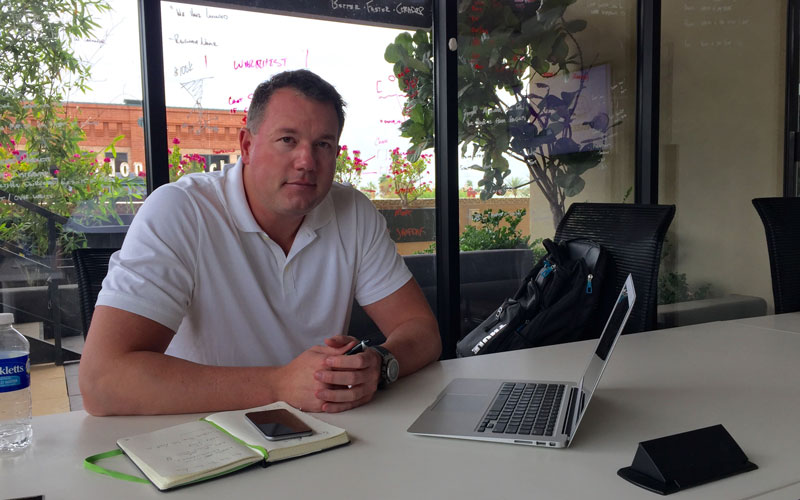
Nate Reis, CEO of Railway Technologies, said he believes he has unlocked the secret to helping local businesses get customers through the door. (Photo by Zac Pacleb/Cronkite News)
The creator of a Tempe-based company believes he has unlocked the secret to helping local businesses get customers through the door.
In January, Railway Technologies launched Railway Search (soon to be Railway Loop), an app that allows customers to search for products and shows them where they can find them. It also provides digital coupons customers can redeem at physical stores.
“We realized that consumers care about products,” Railway CEO and Founder Nate Reis said. “They don’t really care where you get them. We’re not – as much as we hate to say it – loyal to businesses. We’re loyal to the products.”
Railway began to map out businesses in Tempe in January 2015. It digitized more than 350,000 products in more than 350 businesses. Stores use the Railway Station app to geotag their products for users who search for a particular product.
Reis came up with the idea for Railway on a business trip in New York. After catching a red-eye flight, Reis said he “needed four Red Bulls.” Unable to find the energy drink, he ended up snoozing through his meeting. Later, as he prepared for a gala, he realized he forgot cuff links.
“I had these ‘I need’ moments,” he said. “I was plagued at that point because I knew I was about one of the only people with the expertise to be able to pull it off.”
Reis became an entrepreneur in 2007 and founded two companies that dealt with payment solutions. One company, MobiSquad, processed the first Apple Pay acceptance in the United States in 2010, Reis said. In September 2015, he sold both companies.
Reis created Railway to take advantage of those “need” moments. Businesses can use Railway Station to track demographic information, traffic frequency, coupon redemptions and the items customers buy in the store.
He compares Railway to the railways that connected the east to the rest of America in the early 1900s, saying the railways didn’t own the locomotives or the products, but it connected businesses to customers.
“(Businesses) don’t want gimmicks,” said Cody Oborn, the company’s vice president of business solutions. “They don’t want another solution to just sit on the counter. They just wanted a customer.”
Oborn works with sales organizations to help connect with businesses and get their products online. He said the biggest challenge is making sure everything works smoothly once he gives sales organizations the green light to connect with local stores.
“We have to have our ducks in order so that once we hand (businesses) these tools, it works well enough that we don’t run into problems,” he said.
One of the stores that took part in the beta phase was Thirsty Dog 2 Go in Tempe. Its owner, Brandon Manus, said he has seen the benefits of Railway already.
“There’s a lot of potential behind it,” he said. “You can use it not just for local businesses, but for any businesses really to help build clientele. … (There is) potential to do a lot more business, to make it easier for the customer to not only find your business but to know what other products you carry in your business is extremely streamlined as far as I see.”
Reis said he plans to have 10,000 businesses connected in the Phoenix metro area by the end of the year, and he wants the app to run smoothly before the Fiesta Bowl on Dec. 31. After that, Reis plans to tackle Austin, Texas, and Salt Lake City, cities where they have “relationships and a footprint there.”
“We’ve unlocked the secret of connecting with mobile target audiences,” Reis said. “We have created a solution that actually gets people to start shopping locally again.
“Local businesses have a better culture. They can have cooler stuff. They can have a better experience, and I just hate seeing businesses go out of business that have a better product, that have a better service, yet lose because they just don’t have technology.”
Railway plans to connect delivery services to the product-searching tool in the future. Oborn said the goal is to be the connective tissue between businesses without being on the frontlines of the ecosystem.
“This is such a big concept that we want to work with everybody because there’s plenty of money to go around,” Oborn said. “There’s no need to be greedy, and we want to keep the consumer the center of the universe because if the consumer wins, then everybody wins.
“If we do it right, nobody will know our name.”
CORRECTIONS: An earlier version of this article misspelled Cody Oborn’s name. It inaccurately described Nate Reis’ involvement with MobiSquad. He founded the company. The article also incorrectly described Reis’ educational experience at Harvard University. He attended a business school management program there.